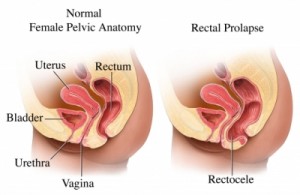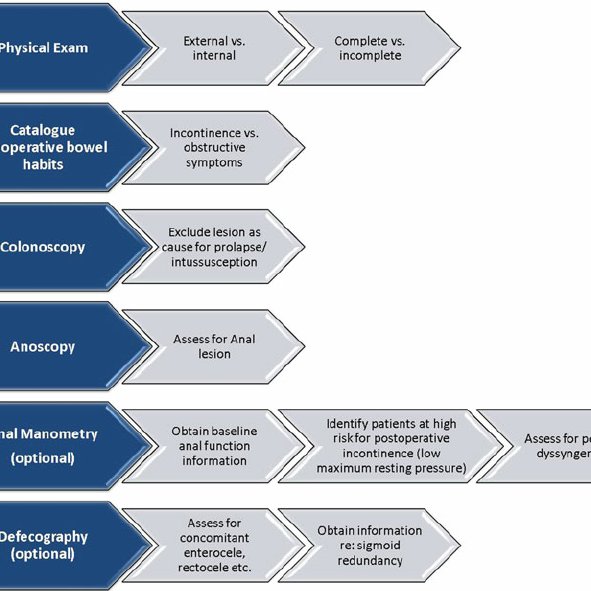
Rectal prolapse refers to the protrusion of either the mucous membrane or the full-thickness lumen of the anus through the anus's anal opening. This is usually the result of various chronic health conditions such as chronic coughing, pregnancy, or other issues that cause intra-abdominal tissue stress including pregnancy, chronic diarrhea, or chronic constipation. It is also sometimes caused by an organ prolapse such as a tumor, adhesions, or a deviated septum. It is also common in patients who have a history of bleeding in the anal area such as with ulcerative colitis, HIV, and some forms of cancer.
Rectal prolapse may occur spontaneously without any underlying health conditions, or it can occur because of some kind of bowel movements. When this occurs, it may be due to constipation or straining during a bowel movement. Rectal prolapsed also may occur in a patient who is having difficulty in defecating. For these patients, the bowel movement could lead to the anal opening becoming slightly wider, which may lead to prolapsed. The condition can also occur after the patient has had a surgical procedure such as surgery for anorexia or bulimia.
Hemorrhoids and prolapsed anus are commonly associated with one another because both are caused by the same type of medical conditions. Hemorrhoids occur when veins around the anus become enlarged and painful. When they become inflamed, they may result in blood clots that become wedged between the walls of the anus. A bulge may form in the anus when the veins swell.
Internal hemorrhoids occur on the inside of the body and may result in bleeding or itching. Hemorrhoids may be the result of infection or they can be from trauma to the anus. If the hemorrhoid becomes very large, it can cause pain and even require surgery to remove it. Other symptoms include itching, burning, and even pain when urinating. In rare cases, there can be severe pain when passing stools move through the anus and a lump may form.
There are many reasons for rectal prolapse, but they are usually associated with poor diet, which puts excessive pressure on the intestinal muscles. When the intestines are weakened, they can easily spill out and cause discomfort and pain. A diet rich in fat is often the most common cause of this condition. The pressure on the intestines as they move can cause the muscles to relax or stretch, causing them to prolapse.

Some cases can also be associated with an infection that can cause the anus to widen. When there is an infection, an overgrowth of bacteria or fungi occurs, which increases the risk of colon rupture. This is not good for those suffering from the disease, because the bacteria can lead to serious problems. The only way to prevent this is by eating a healthy diet and maintaining colon health.
Rectal prolapse caused by infection can be treated with antibiotics to help kill bacteria
A diet rich in fiber helps keep the colon clean. This will help keep your digestive system healthy and your intestines working properly. Many constipated people may find that this is enough to treat symptoms and prevent recurrence of rectal prolapse. but if the infection hasn't cleared up after a few days, doctors may recommend surgery.
Rectal prolapsed anal prolapse can cause many physical problems such as discomfort, pain, and even bleeding. Sometimes, people find that the infection will cause their bowel movements to become hard or painful and they may need a sedative to relax themselves. Most cases do not require any surgery and it will go away on its own. A diet that is low in fat and fiber is often enough to cure the problem. Some people suffer from this condition but are not able to get treatment.